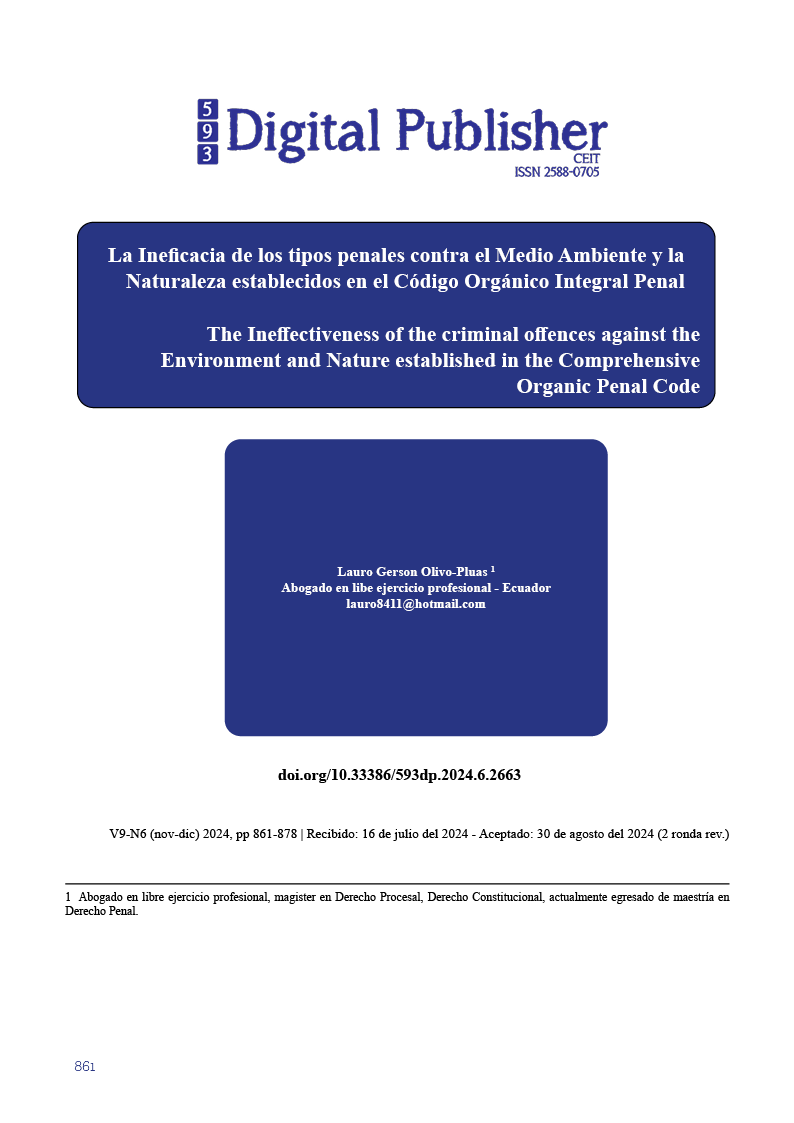The Ineffectiveness of the criminal offences against the Environment and Nature established in the Comprehensive Organic Penal Code
Main Article Content
Abstract
This work is focused on identifying the factors that make or have made inefficient the criminal types established in the Comprehensive Organic Criminal Code, in order to present a possible solution to this problem. Consequently; we will expose the factors that influence this inefficiency; likewise, we will propose a proposal that expands the criminal types in which several types that have not been considered in the Comprehensive Organic Criminal Code (COIP) at the time of their treatment in the National Assembly.
In this work, the method of documentary analysis and assessment of existing research will be used, for which different metasearch engines will be used, such as: Google Scholar, Dialnet, e-book, Scopus, Sci - Hub, among others, in order to identify files, reports or fieldwork published in relation to the rights of nature and the environment; as well as their crimes, in order to analyze the historical and doctrinal evolution on protection worldwide to conclude in our country.
The expected results of this research are:
Identify the factors that contribute to the fact that the criminal types established in the Comprehensive Organic Criminal Code against the Environment and Nature are not effective.
To propose possible solutions so that the criminal types against the Environment and Nature are efficient and effective.
If feasible, propose necessary criminal offenses that are not typified in the COIP.
As a conclusion, it is necessary that the population does not have a sense of responsibility for the importance of protecting and conserving the environment and nature, it is possibly for this reason that other prevention and control regulations have not been able to be efficient or effective, such as: The Organic Code of the Environment, municipal ordinances, even the Organic Comprehensive Criminal Code itself; so too, political and economic power contribute to this problem, which should be considered at least as aggravating factors of the criminal types.
Downloads
Article Details

This work is licensed under a Creative Commons Attribution-NonCommercial-ShareAlike 4.0 International License.
1. Derechos de autor
Las obras que se publican en 593 Digital Publisher CEIT están sujetas a los siguientes términos:
1.1. 593 Digital Publisher CEIT, conserva los derechos patrimoniales (copyright) de las obras publicadas, favorece y permite la reutilización de las mismas bajo la licencia Licencia Creative Commons 4.0 de Reconocimiento-NoComercial-CompartirIgual 4.0, por lo cual se pueden copiar, usar, difundir, transmitir y exponer públicamente, siempre que:
1.1.a. Se cite la autoría y fuente original de su publicación (revista, editorial, URL).
1.1.b. No se usen para fines comerciales u onerosos.
1.1.c. Se mencione la existencia y especificaciones de esta licencia de uso.
References
Acosta, A. (15 de Julio de 2019). Amnistía Internacional. Sin derechos de la Naturaleza no hay plenos Derechos Humanos: https://nextstrategy.amnesty.org/es/2019/07/15/sin-derechos-de-la-naturaleza-no-hay-plenos-derechos-humanos/
Anzora, J. (2020). ACTIVIDAD CRIMINAL Y LA NECESIDAD DE UNA REFORMA PENAL PARA LA EFECTIVA TUTELA DE LOS BIENES JURÍDICOS RELATIVOS A LA NATURALEZA Y MEDIO AMBIENTE EN EL SALVADOR. UNIVERSIDAD DE EL SALVADOR.
Asamblea Constituyente de Bolivia. (2009). Constitución Política del Estado Plurinacional de Bolivia. RO. https://doi.org/http://www.gacetaoficialdebolivia.gob.bo/app/webroot/archivos/CONSTITUCION.pdf
Asamblea Constituyente del Ecuador. (2008). Constitución de la República del Ecuador. Registro Oficial.
Asamblea Legislativa de El Salvador. (9 de noviembre de 2022). Portal del Transsparencia de la Asamblea Legislativa de El Salvador. Portal del Transsparencia de la Asamblea Legislativa de El Salvador: https://asamblea.gob.sv/node/12521
Asamblea Nacional del Ecuador. (2014). Código Orgánico Integral Penal. Quito: Regístro Oficial del Ecuador.
Asamblea Nacional del Ecuador. (2017). Código Orgánico del Medio Ambiente. Quito: Regístro Oficial del Ecuador.
Avendaño, T. R. (2009). ¿Derecho a la naturaleza o derecho de la naturaleza. Reista Iberoamericana de Economía Ecológica, 11(ISSN 13902776), 19-20. https://doi.org/https://www.ecologiapolitica.info/wp-content/uploads/2015/12/38.pdf#page=18
Badal, M. (2022). La protección del medio ambiente por el Derecho Penal Internacional: Orígenes, actualidad y futuro. ANUE.
Barham, V., & De Heredia, M. G. (2011). Caso Texaco 2011. Programa Andino de Derechos Humanos.
Cordero, G. D. (2012). EL CAMBIO CLIMÁTICO. Ciencia y Sociedad, XXXVII(2), 227-240. https://doi.org/https://www.redalyc.org/pdf/870/87024179004.pdf
Cuesta, P. d., & Gutiérrez, A. (2024). Medio Ambiente: Valor Constitucional y Protección Penal. Open Course Ware, 5.
Díaz Cordero, G. (2012). EL CAMBIO CLIMÁTICO. CIENCIA Y SOCIEDAD, 227-240.
Francilaide, V. (2015). CUESTIONES DEL IUS PUNIENDI AMBIENTAL EN EL ESCENARIO DE LA PREVENCIÓN DEL CAMBIO CLIMÁTICO. UNIVERSIDAD DE GRANADA. https://doi.org/http://hdl.handle.net/10481/40028
Grijalva, A., Jara, M. E., & Mrtínez, D. (2013). ESTADO, DERECHO Y ECONOMÍA. Quito: CORPORACIÓN EDITORA NACIONAL.
Ledezma, C. (2014). EL ESTADO ACTUAL DEL IUS PUNIENDI. Facultad de Derecho, Universidad de BArcelona. https://doi.org/https://diposit.ub.edu/dspace/bitstream/2445/96490/1/TFG_Dret_Constanza_Ledesma_Bruno.pdf
Leire, S. E. (2024). MANIFESTACIONES DE LA CRISIS DEL ESTADO SOCIAL EN EL SIMBOLISMO DE LA PROTECCIÓN AMBIENTAL. Fundación BBVA.
Martínez, W., Moreno, S., Noboa, Z., Padilla, F., Rodríguez, H., & Rodríguez Peralta, S. (2002). Derecho Penal del Medio Ambiente. Santo Domingo: Escuela Nacional de la Judicatura.
Misari, C. (2017). Derecho Penal: Parte General. Huancayo: E-book.
Organización de Naciones Unidas. (28 de Julio de 2022). Programa para el Medio Ambiente. La ONU declara que el medio ambiente saludable es un derecho humano: https://www.unep.org/es/noticias-y-reportajes/reportajes/decision-historica-la-onu-declara-que-el-medio-ambiente-saludable
Ossadón Window, M. M. (2010). EFICIENCIA DEL DERECHO PENAL. EL CASO DE LOS DELITOS CONTRA EL MEDIO AMBIENTE. En E. D. AMBIENTE, Revista de Derechode la Pontificia Universidad Católica de Valparaíso (pág. 393).
Ozafraín, L. (2016). El principio de última ratio . Fundamentos en el Derecho Internacional de los Derechos Humanos para una política criminal minimalista. La Plata: Universidad Nacional de La Plata.
Rejane Issberner, L., & Léna, P. (1 de Abril-junio de 2018). El Correo de la UNESCO. El Correo de la UNESCO: https://unesdoc.unesco.org/ark:/48223/pf0000261900_spa
Reyes, S., & Cano, D. (2022). Efectos de la agricultura intensiva y el cambio climético sobre la biodiversidad. Revista de Investigaciones Altoandinas, 53-64.
Reyes-Palomino, S. E., & Cano Ccoa, D. M. (2022). Efectos de la agricultura intensiva y el cambio climático sobre la biodiversidad. Revista de Investigaciones Altoandinas, 53-64.
Reyna, L. (1998). La Protección Penal del Medio Ambiente: Posibilidades y Límites.
Sánchez, J. M. (2001). La Expansión del Derecho Penal. CIVITAS.
Saquicela, I., & Chica, K. (2023). LA CONSTITUCIÓN COMO LIMITE AL IUS PUNIENDI EN UN ESTADO CONSTITUCIONAL DE DERECHO. Revista Debate Jurídico Ecuador, 6(3), 250-266. https://doi.org/ISSN 2600-5549
Segura, M. (2015). La problematica de los delitos contra el medio ambiente. Elche: Universitas.
Simon, F. (28 de enero de 2024). Red social X. Red social X: https://twitter.com/farithsimon/status/1751753485211578796?t=0e02FateJ90LWKpPCX_wvA&s=08
Varas, E., & Paz y Miño, E. (13 de Mayo de 2024). El polémico proyecto de Lavinia Valbonesi en Olón, explicado. GK, pág. Principal. https://gk.city/2024/05/09/conflicto-ambiental-olon-bosque-protector-gobierno-noboa-explicado/
Villegas, E. (2010). Los bienes jurídicos colectivos en el derecho penal. Astrea.
Yaguachi, F. (2022). PROTECCIÓN DE LOS SERVICIOS AMBIENTALES DE LOS BOSQUES. MIRADA DESDE EL DERECHO PENAL AMBIENTAL. REVISTA METROPOLITANA DE CIENCIAS APLICADAS, 5(3), 67-76. https://doi.org/https://orcid.org/0000-0001-5311-5125
Zaffaroni, E. (2019). La nueva crítica criminológica. Quito: Editorial El Siglo.


